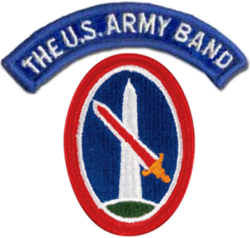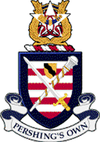United States Army Band
| The United States Army Band | |
|---|---|

The United States Army Band Shoulder Sleeve Insignia
|
|
| Active | 25 January 1922 – present |
| Country |
|
| Branch |
|
| Garrison/HQ | Fort Myer |
| Nickname(s) | "Pershing's Own" |
| March | "The Army Goes Rolling Along" |
| Website | www |
| Commanders | |
| Current commander |
Colonel Timothy J. Holtan |
| Insignia | |
| Coat of Arms |  |
The United States Army Band, also known as "Pershing's Own", is the premier musical organization of the United States Army, founded in 1922. Before 2002, the United States Army Band was the only Washington-based military band to have participated in a theater of foreign combat operations. There are currently eight official performing ensembles in the unit: The United States Army Concert Band, The United States Army Ceremonial Band, The Army Chorus, The Army Blues, The Army Band Downrange, the U.S. Army Herald Trumpets, The Army Strings, and The Army Brass Quintet.
The United States Army Band was established on January 25, 1922 by General of the Armies John J. Pershing, Army Chief of Staff in emulation of European military bands he heard during World War I. In its early years, the band was featured on RCA, CBS, the Mutual Broadcasting Network, and other networks. The band also completed four national tours between 1928 and 1931 and was noted for its professionalism during a trip to Spain for the Ibero-American Exposition of 1929.
In June 1943, the United States Army Band was called overseas to perform in North Africa and in Europe during World War II. The band received a campaign streamer for their efforts during the Rhineland Campaign. This period also saw the band perform with numerous well-known artists and composers, many as part of the very successful Freedom Sings concert series that started in 1950 and continued for several years. Notable musicians included Metropolitan Opera bass Jerome Hines, composers Paul Hindemith and Percy Grainger, and the pianist duo Whittmore and Lowe. Similarly, several well-known entertainers and recording artists were band members during this period. Eddie Fisher, Robert Dini, and Steve Lawrence were very popular during the 1950s, as were harpist Lloyd Lindroth, future Metropolitan Opera tenor George Shirley, and announcer Charles Osgood.
...
Wikipedia
